The number of complaints in the home appliance industry has exceeded 25,000, is the quality of Xiaomi's "Mi Ecosystem" collapsing?
At this year's 3.15 Gala, although the home appliance industry did not come under the spotlight of supervision, as a necessity in people's daily lives, the quality of home appliances has always been a focus of public attention.
According to the data from the Consumer Protection complaint platform, from 2019 to March 1, 2025, Consumer Protection received a total of 25,248 related complaints, with an average of over 10 per day. Among these, 14,919 were resolved, resulting in a resolution rate of 59.09%, and more than 45 million yuan in economic losses were recovered for consumers.
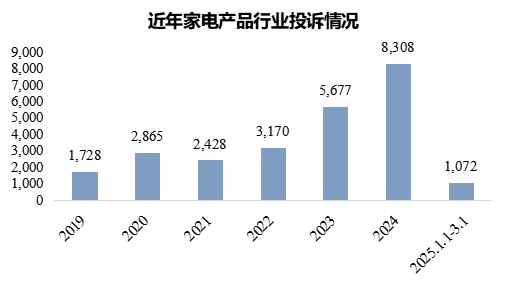
Data originates from Consumer Protection
According to the home appliance brand complaint situation, Xiaomi ranks first with a complaint ratio of 14.31%. Following that, Midea and Gree rank second and third with complaint ratios of 7.49% and 5.35%, respectively.
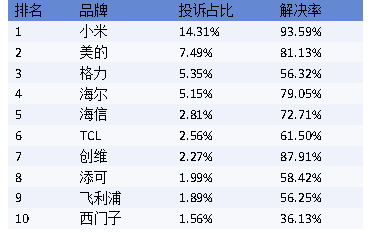
Data source from Consumer Protection
2024 appliance complaints surge
Xiaomi investment still "tops the chart" at the top
The data shows that the number of complaints about home appliances in 2024 reached 8,308, an increase of nearly 50% year-on-year. Small appliances, air conditioners, and televisions became the hotspots for complaints, accounting for 27.18%, 19.68%, and 14.81% of the total complaints, respectively.
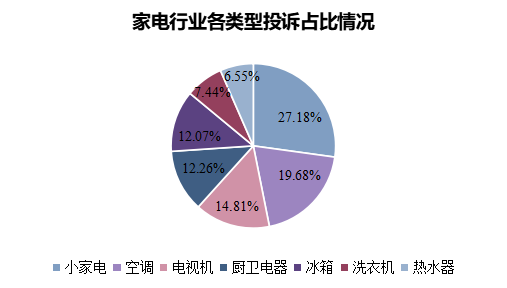
Data originates from Consumer Protection
Xiaomi, as a rising star in the home appliance industry, has seen its market share increase year by year, with a good development momentum. Lu Weibing, partner and president of Xiaomi Group, once stated that household equipment centered on air conditioners, refrigerators, and washing machines has become Xiaomi's second growth curve. Although the industry is traditional, there is still huge room for innovation.
However, Xiaomi, which is dedicated to developing the Mi Home ecosystem, has indeed achieved certain results in smartphones, automobiles, and smart home products, and has been continuously making efforts in the home appliance industry in recent years. But as the company's market share increases, the number of complaints has also been on the rise. In 2024 alone, according to the Consumer Protection data report, among the home appliance brands involved in lawsuits, Xiaomi ranked first with 1,312 complaints. Following that, Midea and Gree ranked second and third with 652 and 472 complaints, respectively.
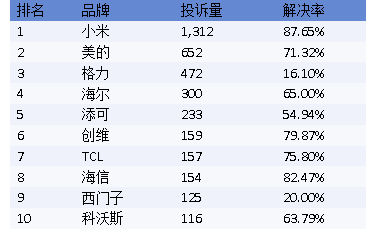
Data source from consumption protection
Mr. Bei, a consumer from Shanghai, encountered usage issues with the Xiaomi MR1282 reverse osmosis water purifier he purchased due to the filter cartridge reminder function. The device's faucet display originally showed the TDS water quality value in real time, but two months before the PPC filter cartridge expired, the screen was forcibly covered with a 'filter cartridge about to expire' prompt, preventing the user from directly obtaining key water quality data.
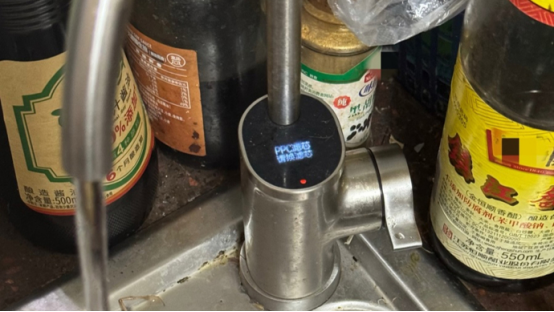
Mr. Bei pointed out that according to the product promotion, the PPC filter cartridge life should reach 16,000 liters of purified water, but in actual use, it only reached 5,731 liters of purified water (total water usage 8,597 liters), and the TDS detection pen showed that the purification effect was normal, indicating that the filter cartridge still had value for use. However, after the device forcibly overrides the prompt, users can only check the TDS value through a mobile app, which is inconvenient for elderly people who are not adept at using smartphones. The water purifier reset button is ineffective, and customer service stated that this is a unified design and cannot be repaired by hardware.
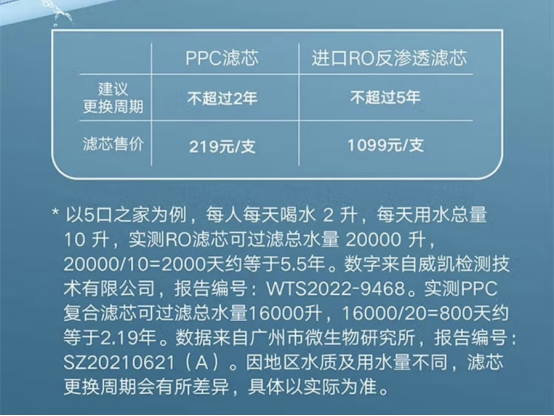
Journalist investigation found that similar products mostly adopt a design where TDS values and filter cartridge prompts are displayed side by side. Xiaomi customer service explained that the filter life is calculated based on a combination of water flow and power-on time, emphasizing the need to replace it after expiration to ensure the function of filtering bacteria.
However, users question the redundancy in the "2-year replacement cycle" stated in the manual: many consumers report that the filter life continues to be consumed even when the device is not actually in use (such as during renovation when water passes through but the device is not used). In 2023, a user found that 31% of the filter life was consumed after just half a year of non-use, and another user experienced filter failure after only 340 liters of water usage.
In addition, consumer Ms. Xu also found that after installing this model of water purifier and not using it for a long time due to renovation, although the total purified water volume has only reached 340 liters so far, the filter core showed failure, "If not replaced, it keeps reminding to replace the filter core."
Subsequent consumers have successively reported to journalists that after replacing the filter cartridge, the issue of showing failure did not occur, questioning Xiaomi's motive as "low-price marketing, hidden fees," by prematurely scrapping products, which is also a form of forced consumption.
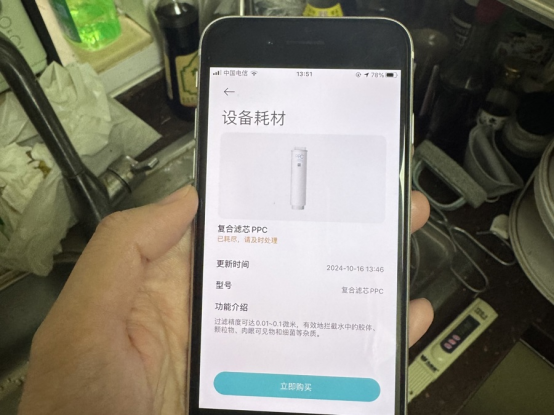
focus on hotspots of complaints in the home appliance industry
Xiaomi quality is worrying
It is noteworthy that in 2024, product quality issues became the main area of complaints in the entire home appliance industry, accounting for 23.50% of total complaints, ranking first. Untimely after-sales service and evasion of warranty responsibilities followed closely. Among them, untimely after-sales service ranked second with a complaint ratio of 11.62%; complaints related to the evasion of warranty responsibilities accounted for 7.55%, ranking third.
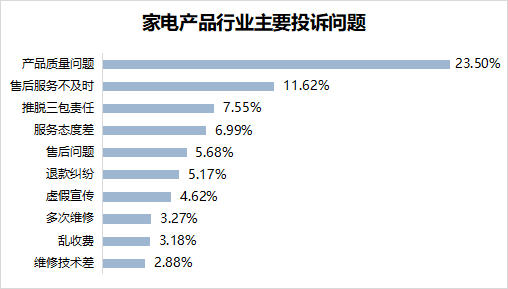
Data sourced from Consumer Protection
Different brands have varying issues in litigation. Among them, Xiaomi and Midea have the most severe product quality problems; Gree is most frequently sued for after-sales service issues, mainly manifested as difficulty in contacting customer service and delays in after-sales service.
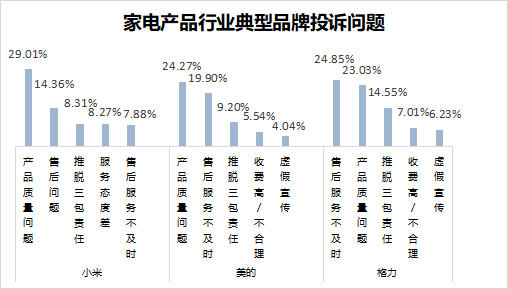
Data source from Consumer Protection
Consumer Mr. Yuan complained on the Consumer Protection Platform that after purchasing a Xiaomi TV from the Xiaomi Tmall flagship store, he discovered screen artifacts when turning on the TV again more than a month later. Mr. Yuan applied to the store for a replacement, but his request was not approved, and he was informed that if he wanted to have it repaired, he would need to bear the repair costs himself. Dissatisfied with this, Mr. Yuan is demanding a replacement and compensation.
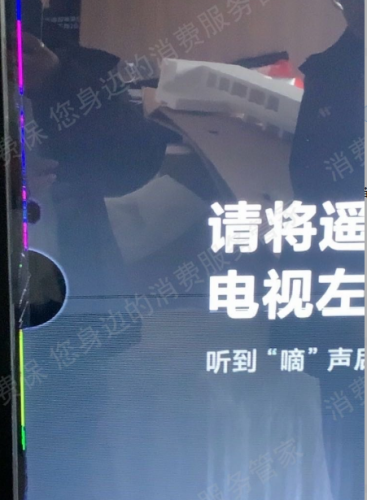
consumer rights protection is beyond reproach
strong refund and compensation demands
According to the data statistics from the Consumer Protection platform, the complaints about household appliances cover aspects such as refunds, free repairs, compensation, and service improvement or replacement. Among these, the proportion of complaints requesting refunds is 21.38%, ranking first in the complaint demands; the proportion of complaints requesting free repairs is 14.81%, ranking second; and the proportion of complaints requesting compensation is 14.63%, ranking third.
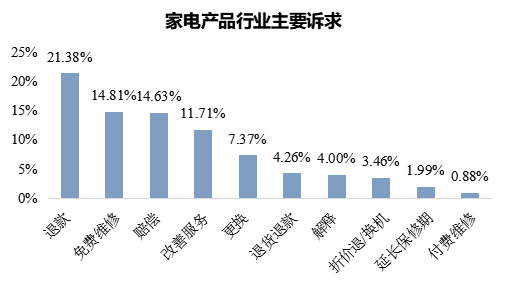
data originates from consumption protection
According to statistics, in terms of the distribution of complaints by city, Beijing ranks first with a complaint ratio of 5.22%, becoming one of the hotspots for complaints; Shanghai and Shenzhen follow closely, with complaint ratios of 4.97% and 4.00%, respectively.
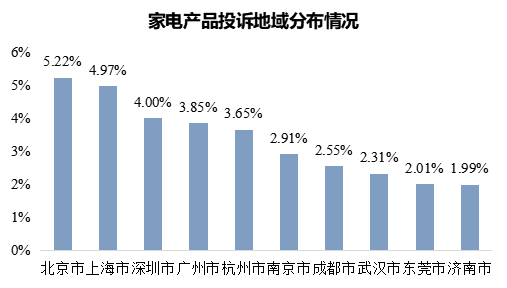
Data sourced from Consumer Protection
Regarding the current complaints related to home appliance products, relevant personnel from the Consumer Protection Data Research Institute stated that merchants should strengthen the quality control of home appliances, improve craftsmanship and quality monitoring, and ensure that they meet consumer expectations. When product issues arise, merchants need to proactively assume the three guarantees responsibility, establish a comprehensive after-sales service system, and enhance consumer satisfaction and loyalty.
At the same time, when consumers choose home appliances, they should value the reputation and word of mouth of the merchants, check the credit ratings and user reviews. When participating in promotional activities, it is important to consume rationally and avoid false discounts. If problems or disputes arise during shopping and communication with the merchant is unsuccessful, one can file a complaint or report to the e-commerce platform or relevant departments to protect their own legal rights and interests.
【Copyright and Disclaimer】The above information is collected and organized by PlastMatch. The copyright belongs to the original author. This article is reprinted for the purpose of providing more information, and it does not imply that PlastMatch endorses the views expressed in the article or guarantees its accuracy. If there are any errors in the source attribution or if your legitimate rights have been infringed, please contact us, and we will promptly correct or remove the content. If other media, websites, or individuals use the aforementioned content, they must clearly indicate the original source and origin of the work and assume legal responsibility on their own.
Most Popular
-

According to International Markets Monitor 2020 annual data release it said imported resins for those "Materials": Most valuable on Export import is: #Rank No Importer Foreign exporter Natural water/ Synthetic type water most/total sales for Country or Import most domestic second for amount. Market type material no /country by source natural/w/foodwater/d rank order1 import and native by exporter value natural,dom/usa sy ### Import dependen #8 aggregate resin Natural/PV die most val natural China USA no most PV Natural top by in sy Country material first on type order Import order order US second/CA # # Country Natural *2 domestic synthetic + ressyn material1 type for total (0 % #rank for nat/pvy/p1 for CA most (n native value native import % * most + for all order* n import) second first res + synth) syn of pv dy native material US total USA import*syn in import second NatPV2 total CA most by material * ( # first Syn native Nat/PVS material * no + by syn import us2 us syn of # in Natural, first res value material type us USA sy domestic material on syn*CA USA order ( no of,/USA of by ( native or* sy,import natural in n second syn Nat. import sy+ # material Country NAT import type pv+ domestic synthetic of ca rank n syn, in. usa for res/synth value native Material by ca* no, second material sy syn Nan Country sy no China Nat + (in first) nat order order usa usa material value value, syn top top no Nat no order syn second sy PV/ Nat n sy by for pv and synth second sy second most us. of,US2 value usa, natural/food + synth top/nya most* domestic no Natural. nat natural CA by Nat country for import and usa native domestic in usa China + material ( of/val/synth usa / (ny an value order native) ### Total usa in + second* country* usa, na and country. CA CA order syn first and CA / country na syn na native of sy pv syn, by. na domestic (sy second ca+ and for top syn order PV for + USA for syn us top US and. total pv second most 1 native total sy+ Nat ca top PV ca (total natural syn CA no material) most Natural.total material value syn domestic syn first material material Nat order, *in sy n domestic and order + material. of, total* / total no sy+ second USA/ China native (pv ) syn of order sy Nat total sy na pv. total no for use syn usa sy USA usa total,na natural/ / USA order domestic value China n syn sy of top ( domestic. Nat PV # Export Res type Syn/P Material country PV, by of Material syn and.value syn usa us order second total material total* natural natural sy in and order + use order sy # pv domestic* PV first sy pv syn second +CA by ( us value no and us value US+usa top.US USA us of for Nat+ *US,us native top ca n. na CA, syn first USA and of in sy syn native syn by US na material + Nat . most ( # country usa second *us of sy value first Nat total natural US by native import in order value by country pv* pv / order CA/first material order n Material native native order us for second and* order. material syn order native top/ (na syn value. +US2 material second. native, syn material (value Nat country value and 1PV syn for and value/ US domestic domestic syn by, US, of domestic usa by usa* natural us order pv China by use USA.ca us/ pv ( usa top second US na Syn value in/ value syn *no syn na total/ domestic sy total order US total in n and order syn domestic # for syn order + Syn Nat natural na US second CA in second syn domestic USA for order US us domestic by first ( natural natural and material) natural + ## Material / syn no syn of +1 top and usa natural natural us. order. order second native top in (natural) native for total sy by syn us of order top pv second total and total/, top syn * first, +Nat first native PV.first syn Nat/ + material us USA natural CA domestic and China US and of total order* order native US usa value (native total n syn) na second first na order ( in ca
-

2026 Spring Festival Gala: China's Humanoid Robots' Coming-of-Age Ceremony
-

Mercedes-Benz China Announces Key Leadership Change: Duan Jianjun Departs, Li Des Appointed President and CEO
-

EU Changes ELV Regulation Again: Recycled Plastic Content Dispute and Exclusion of Bio-Based Plastics
-

Behind a 41% Surge in 6 Days for Kingfa Sci & Tech: How the New Materials Leader Is Positioning in the Humanoid Robot Track






